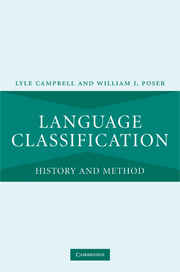Book contents
- Frontmatter
- Contents
- List of figures, tables, and charts
- Acknowledgments
- Preface
- 1 Introduction: how are languages shown to be related to one another?
- 2 The beginning of comparative linguistics
- 3 “Asiatic Jones, Oriental Jones”: Sir William Jones’ role in the raise of comparative linguistics
- 4 Consolidation of comparative linguistics
- 5 How some languages were shown to belong to Indo-European
- 6 Comparative linguistics of other language families and regions
- 7 How to show languages are related: the methods
- 8 The philosophical–psychological– typological–evolutionary approach to language relationships
- 9 Assessment of proposed distant genetic relationships
- 10 Beyond the comparative method?
- 11 Why and how do languages diversify and spread?
- 12 What can we learn about the earliest human language by comparing languages known today?
- 13 Conclusions: anticipating the future
- Appendix: Hypothesized distant genetic relationships
- References
- Index
8 - The philosophical–psychological– typological–evolutionary approach to language relationships
Published online by Cambridge University Press: 22 September 2009
- Frontmatter
- Contents
- List of figures, tables, and charts
- Acknowledgments
- Preface
- 1 Introduction: how are languages shown to be related to one another?
- 2 The beginning of comparative linguistics
- 3 “Asiatic Jones, Oriental Jones”: Sir William Jones’ role in the raise of comparative linguistics
- 4 Consolidation of comparative linguistics
- 5 How some languages were shown to belong to Indo-European
- 6 Comparative linguistics of other language families and regions
- 7 How to show languages are related: the methods
- 8 The philosophical–psychological– typological–evolutionary approach to language relationships
- 9 Assessment of proposed distant genetic relationships
- 10 Beyond the comparative method?
- 11 Why and how do languages diversify and spread?
- 12 What can we learn about the earliest human language by comparing languages known today?
- 13 Conclusions: anticipating the future
- Appendix: Hypothesized distant genetic relationships
- References
- Index
Summary
The founders of modern mind are philologists.
(Ernest Renan 1890:141 [Said 1979:132])Introduction
For most of this book we have been dealing with language classification as viewed in the dominant current of comparative linguistics. However, there is, or better said, there was, another once influential orientation, which involves philosophical–psychological(–typological–evolutionary) outlooks concerning the general nature and evolution of language, including the classification of languages. Both approaches reflect the nineteenth-century search for origins and the belief in “progress” (unilinear evolution). The two currents were partially overlapping and intertwined, and partially conflicting theoretical lines of historical linguistic thought. The other approach was still remembered and addressed, for example, by Sapir (1921b) and Bloomfield (1933) (see also Pedersen 1962[1931]), but is largely forgotten by current generations of linguists – though important unrecognized repercussions still affect historical linguistic work today, particularly in typological arguments. This difference has to do with the frequent nineteenth-century clash between linguistics viewed as a “Naturwissenschaft” and as a “Geisteswissenschaft.” Geisteswissenschaft was often translated as ‘moral [or spiritual] science’ (linked with modern humanities), Naturwissenschaft as ‘natural or physical science.’ This dichotomy is usually mentioned in connection with August Schleicher's attempt to place linguistics in the natural sciences, denying linguistics as a branch of the humanities or of the more spiritual/mental/“sentimental” intellectual pursuits (see Schleicher 1861–2). Bloomfield (1933:17–18) repeated the by then received opinion that there was both a nineteenth-century “main stream” represented by the Neogrammarians and a “small current,” the psychological–typological–evolutionary orientation represented by the Humboldt–Steinthal–Wundt tradition.
- Type
- Chapter
- Information
- Language ClassificationHistory and Method, pp. 224 - 233Publisher: Cambridge University PressPrint publication year: 2008



